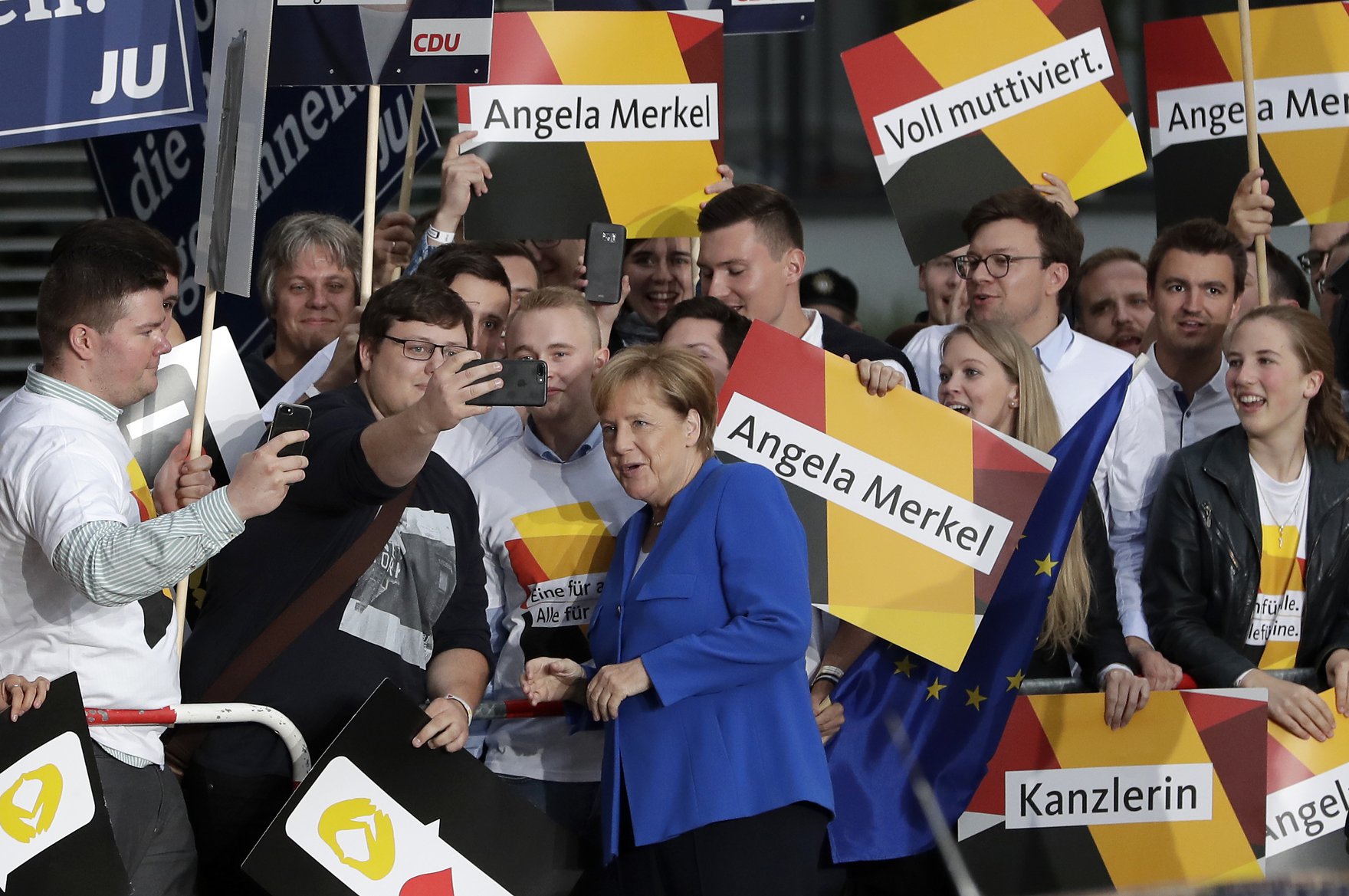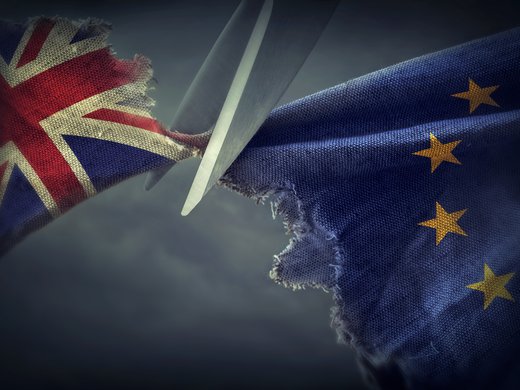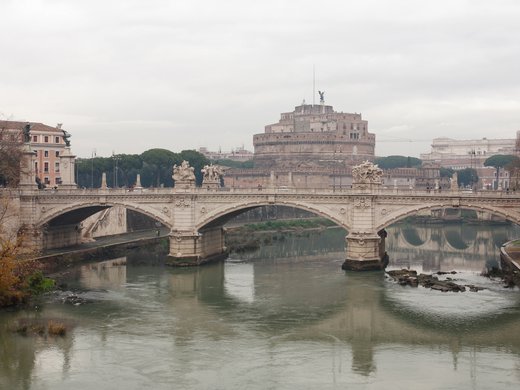Angela Merkel is taking no chances. As the German chancellor seeks a fourth term she has spent the past few weeks criss-crossing the country to take part in countless election rallies and town hall meetings. Her governing conservative Christian Democratic Union (CDU) is running a campaign based on stability, reliability and success — qualities her party is confident Merkel exemplifies in the minds of voters, judging from the many posters that portray her. She has become the personification of the Christian Democrats.
After almost a dozen years in office, Merkel’s popularity remains very high compared to her Social Democratic Party opponent, Martin Schulz, who is lagging around 15 percentage points behind. For the moment, barring any major setback, the conservative bloc — which includes the CDU’s sister party in Bavaria, the Christian Social Union — is on course to remain the largest bloc after the vote on September 24. Merkel will again be at the helm. But don’t imagine there is any sense of complacency in the Chancellery or at party headquarters. Depending on the polls, between 20 and 40 per cent of voters are still undecided.
Whoever wins, the next chancellor will be saddled with two challenges — one domestic, one strategic. The first is the composition of the next coalition; the second is Germany’s agenda for Europe.
The Domestic Calculus
Christian Democrat officials yearn for an end of the grand coalition with the Social Democrats. Merkel had headed such a coalition during her first stint in office from 2005 to 2009 and again from 2013 to 2017. These CDU officials would view a coalition with the pro-business Free Democratic Party as ideal, not that the coalition that was in power from 2009 to 2013 achieved much. But under its new and charismatic leader, Christian Lindner, the Free Democrats are willing to address big issues — such as digitization and demography, migration and tax reform — that the CDU have ignored in the campaign. But it is not certain that the Christian Democrats and the Free Democrats together will have a majority of parliamentary seats to form the next government. The possibility of inviting the Greens cannot be ruled out.
Meanwhile, Martin Schulz, who continually speaks about unseating Merkel, would, if he were to succeed, consider forming a coalition with the Greens, and even with the conservatives, provided the Social Democrats led the government.
And, finally, there is the spectre that haunts the German established political classes: the Alternative for Germany party, or AfD. This anti-immigration, anti-Islam and Euroskeptic party (with anti-Semitic tendencies, too) needs to win five percent of the votes to enter parliament. Opinion polls show they could easily jump that hurdle — which would show the extent of the opposition to Merkel’s refugee policy and her decisionin 2015 to admit more than one million refugees fleeing the wars in Syria and Iraq.
Such a victory by the AfD would confirm the increasing fragmentation of Germany’s political party system. It would also give parliamentary legitimacy to a far-right nationalist and populist party that could tarnish Germany’s reputation of having been able to stem the rise of such xenophobic movements.
European Economic Integration
Leaving aside the uncertainty about the make-up of the next German government, one thing is certain. The outcome of the election, despite the lack of fizz, will have a profound impact on the future of the European Union in all its ramifications. This is the second challenge for Germany’s leaders: the future of the European project.
The sources of Germany’s conundrum are threefold: Emmanuel Macron’s victory in becoming president of France; the decision by Britain to leave the European Union; and the election of Donald Trump as US president. These three events have together changed the geostrategic role of Germany. Indeed, these three developments have already changed the public discourse about the future of the euro zone; about the viability of European security and defence; and about Europe’s place in the world, in particular its transatlantic relationship.
Until recently, Merkel was considered the undisputed leader of Europe. This was largely because many of the European Union’s other leaders were weak, notably former French President François Hollande. Hollande never managed to reverse the economic decline of France. That failure only prolonged France’s political weakness inside the European Union. As for Britain, it was preoccupied with its relationship with Europe.
So it was Merkel and her finance minister, Wolfgang Schäuble, who largely steered the European Union through the euro-zone crisis. The tough austerity measures Berlin imposed on Greece, Ireland, Spain and Portugal in return for financial assistance, were, and still are, highly controversial.
Schäuble can indeed claim — notwithstanding the very high unemployment levels, particularly among young people, in these countries — that because growth is now returning to these markets and they are becoming more competitive, that his policies have been vindicated.
But Berlin’s consistent opposition to any loosening of the austerity policies imposed on the indebted euro-zone countries has caused tensions.
Still, the euro zone has so far held together, despite the stalled integration, as steps such as a European Capital Markets Union have been held up. All along, Berlin has consistently opposed an integration that would create an EU finance minister or a common budget.
This is where Macron’s victory matters.
Macron wants a common budget, particularly one that finances investment to stimulate growth and has a stabilizing effect during economic crises. And he supports more social and fiscal convergence. The next German government will have to deliver something to him. After all, Macron defeated handsomely the populist and Euroskeptic National Front party led by Marine Le Pen. He also promised to introduce pro-growth reforms. On August 31, Macron unveiled an ambitious reform program aimed primarily at liberalizing the labour market and encouraging investment. He seems determined to stick to his election pledge.
A France with a strong economy is crucial for Germany. Until now, because the German economy was so strong, it brought with it political strength. Conversely, because the other euro-zone economies were economically weak, their political influence was also weak. That left Merkel alone at the top in Europe. In the case of France, Merkel now has a competitor, and one that is committed to reforming France and pushing Europe toward more economic and more political integration. Counterintuitively perhaps, this is actually good news for Germany and for the rest of the European Union.
Until Macron’s election, Germany was in no position to push for more integration. Such a move would have been perceived by some EU countries, and particularly by Poland and Britain, as Berlin chiselling away at the sovereignty of the member states. More importantly, Germany didn’t want to assume the role of leading the integration juggernaut because of its past. It did not want to be seen to be dictating Europe’s future direction. Now that France is in the ascendancy — and, too, as Spain grows in confidence as its economy improves — Germany has allies who want a stronger and more integrated Europe.
Merkel herself for several years shied away from explaining how she envisaged the future of the European Union. Perhaps she believed any mention of further integration would give fodder to Euroskeptic populist parties or she was unsure which direction the European Union should take. Yet Macron’s unequivocal support for Europe during his own election campaign showed how a politician could successfully play a pro-Europe card and see off a fiercely populist nationalist challenge.
Interestingly, during this German election campaign, Merkel has begun to invoke Europe. Her annual summer conference to the press corps in Berlin on August 29 revealed how the chancellor was now even willing to talk about her plans for the European Union. She said she backed proposals for a euro-zone budget and an EU finance minister, echoing some of Macron’s ideas.
“I could imagine an economy and finance minister…so that we get a higher degree of united competitiveness,” she said. Her main rival, Schulz, a former president of the European Parliament, would endorse such ideas too.
This is a remarkable development in international governance that could resonate for decades.
It means that, in short, the next German government will now attempt to deal with the unfinished business of integrating the euro zone. It’s not going to be easy. Not just because Germans loathe the idea of having to pick up or share the debt of other euro-zone countries. A more integrated euro zone would inevitably lead to a two-speed Europe, with a fast lane for countries ready to deepen joint economic governance and a slow lane for countries that would become more peripheral. Poland, which has not adopted the euro and so would be consigned to the slow lane, would balk at EU moves toward greater integration, on the grounds that the emergence of a two-speed European Union would lead to domination by Europe of France and Germany and be discriminatory by its nature.
That’s why the Central Europeans, even though their economies are so intertwined with Germany’s, regret Britain’s leaving the European Union. With its inborn anti-integrationist outlook, Britain opposed any further integration, two-speed or not.
European Security
If the euro zone’s future direction is one of the big European geostrategic challenges facing the next German government, there is more and just as important unfinished business to take care of, this time in the security and defence areas.
Brexit and the election of Donald Trump have given Germany opportunities to influence the future of the European Union’s security and defence policy. In the case of Brexit, for several years Britain blocked plans for the European Union to have its own military planning headquarters. London feared that such a headquarters would weaken the North Atlantic Treaty Organization (NATO) alliance or compete with it and that the European Union would mutate into its own kind of independent defence organization.
That opposition was short-sighted. Independent of NATO, the European Union has at least a dozen civilian and police training and military missions. None of them is based on hard power. But they all require substantial planning and logistical support. An EU military headquarters could create a culture of cohesion and even a culture of self-confidence that could gradually progress to the European Union dealing with the idea of embracing hard power.
The military planning headquarters is now going ahead, thanks to Brexit.
Meanwhile, there are intriguing signs of a shift in Germany’s position when it comes to the future of EU defence. Spurred by President Trump’s views about NATO during his election campaign — with the suggestion NATO “is obsolete” and that European allies had been free-riding and taking for granted for decades America’s security guarantee for Europe — Merkel reacted.
In a beer tent in Munich in late May, after a Group of Seven summit in Italy during which she had had several discussions with Trump, Merkel announced — whether for electoral reasons or not — that “the era in which we could fully rely on others is over to some extent — that’s what I experienced over the past several days.” She added: “We Europeans must really take our fate into our own hands.”
Merkel has yet to spell out what exactly that means. Her party continues to rule out the idea of establishing a European “army,” and neither Germany nor the other EU member states are ready to discuss such an option. There is still an understanding that Europe’s security guarantee remains the United States. Going it alone, without the United States, is not an option any country in the European Union. But Trump’s stance has emboldened voices who favour a more balanced transatlantic relationship based on greater trust and cooperation.
Given the threats that Europe faces vis-à-vis Russia, its southern neighbourhood and the vulnerability of its eastern neighbourhood, security and defence challenges will rank higher on the list of priorities of Germany’s next chancellor than in the recent past.
One front where Berlin has taken steps to build its own capacity is on dealing with terrorist and cyber attacks. The German defence ministry last April created a new Cyber and Information Space Command that will eventually be staffed by 13,500 soldiers and civilians. This decision shows how one of the world’s biggest export-trading countries sees the need to establish a sophisticated system to protect its economic, energy and health infrastructure.
Strategically, it is about increasing Germany’s ability to defend its interests, but it’s also about increasing the resilience of the European Union — a development the United States would welcome.
Yet, despite these national and regional advances, a central challenge and necessity remains ensuring that the European members of NATO pull their weight on defence.
During the election campaign, the Social Democrats have questioned Germany’s commitment to spending two percent of GDP on defence, as was agreed during the NATO summit in Cardiff, Wales, in 2014. They have even claimed — in a bid to tap into a latent pacifism, if not anti-Americanism, in sections of German society — that Merkel is beholden to Trump. However, no political party has spelled out how Germany could defend itself without NATO and the United States.
A more balanced transatlantic relationship requires resolving the domestic political arithmetic in a way such that European commitments to NATO are not perennially in question, because this alliance remains the foundation of the European Union’s security.
In short, whoever does become the next chancellor of Germany, Berlin — with the support of Paris — has much unfinished business to take care of.



